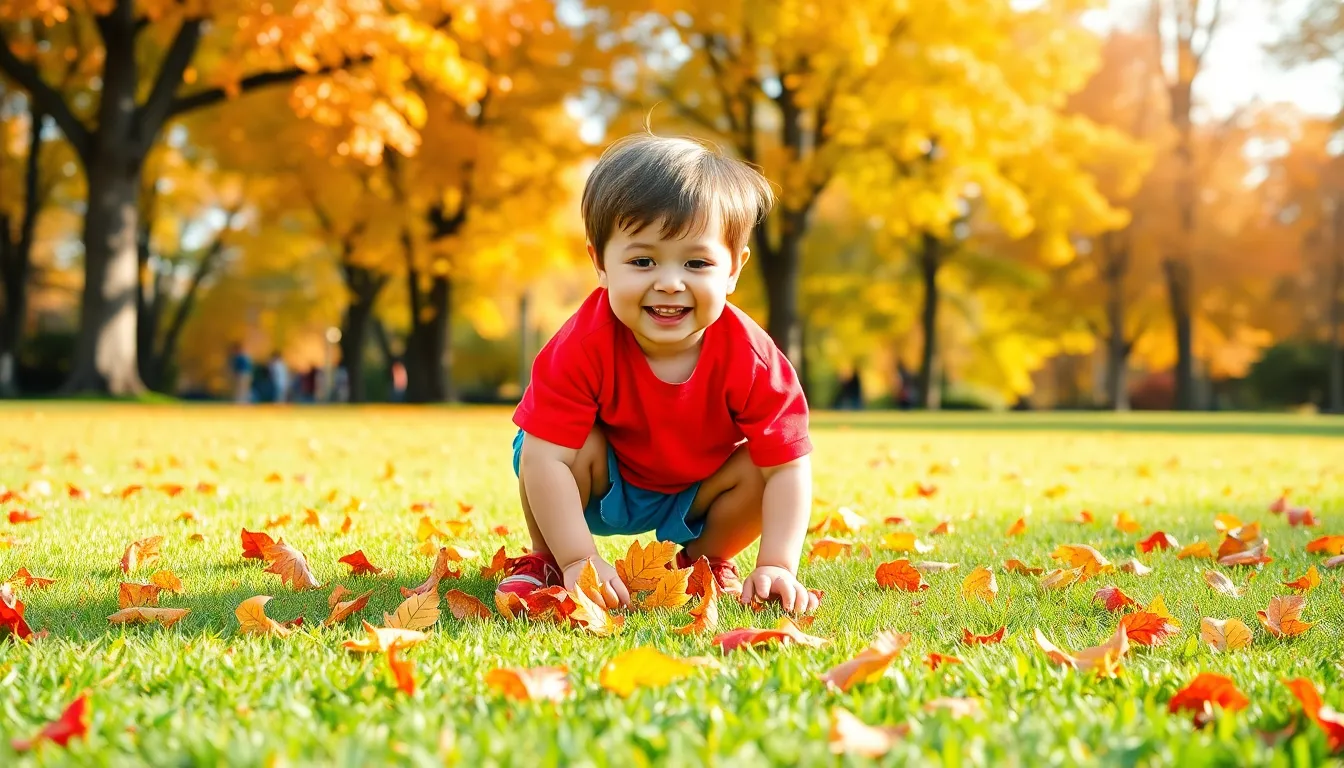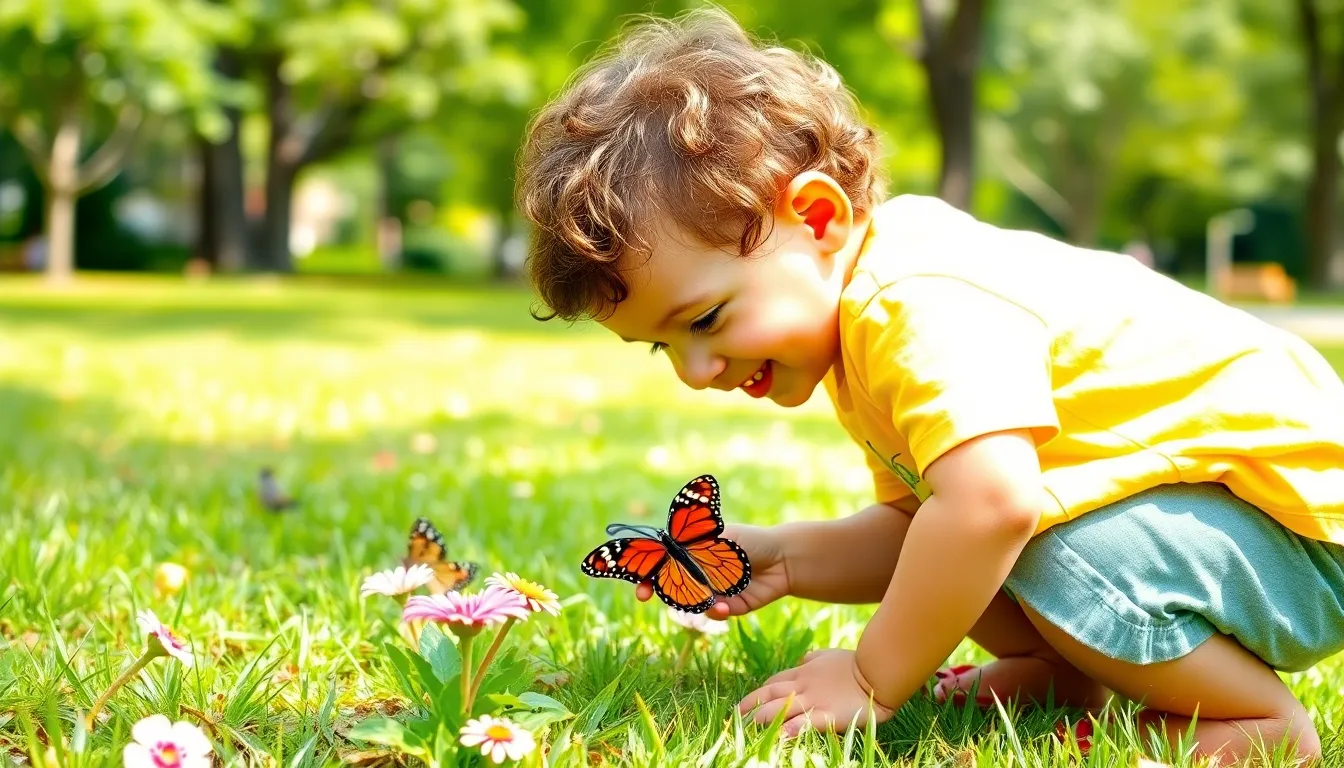Table of Contents
ToggleGetting toddlers to embrace the great outdoors can feel like herding cats. But fear not! Nature is bursting with fun and engaging activities that’ll have your little ones giggling and exploring in no time. From bug hunts to leaf art, the world outside is a treasure trove of adventure just waiting to be discovered.
Nature Activities for Toddlers: An Overview
Nature offers numerous engaging activities for toddlers. Outdoor exploration encourages sensory development and curiosity. Activities like bug hunts allow children to observe insects up close and learn about their habitats. Collecting leaves and making leaf art introduces creativity while fostering an appreciation for nature’s beauty.
Gardening serves as another delightful option. Toddlers can help plant seeds, water plants, and watch them grow. This hands-on experience cultivates responsibility and patience. Additionally, nature walks promote physical activity while enhancing observational skills. Parents can point out various plants, animals, and colors along the way.
Creating scavenger hunts engages young children in a fun learning process. Using simple checklists, toddlers can search for items like acorns, flowers, or specific leaves. This activity combines excitement with education while reinforcing language skills.
Building fairy houses from natural materials stimulates imaginative play. Children can gather sticks, stones, and leaves to create their own miniature homes. This encourages artistic expression and creativity in outdoor settings.
Lastly, nature-based art projects expand a child’s creativity. Using items found during outdoor adventures, children can create collages or nature prints. Engaging with natural materials helps toddlers develop fine motor skills while exploring texture and color.
Integrating these nature activities into a toddler’s routine promotes outdoor time and enriches their early learning experience. Nature’s wonders support healthy development, making it essential for young children to connect with their environment.
Benefits of Nature Activities


Engaging in nature activities provides numerous benefits for toddlers. These experiences foster growth in several key areas.
Physical Development
Toddlers enhance their physical skills through outdoor activities. Climbing, running, and jumping engage large muscle groups, improving overall coordination. Walking through uneven terrains boosts balance and strength. Manual tasks like picking up sticks or digging in the soil refine fine motor skills. Collecting materials for projects encourages hand-eye coordination. Regular physical activity also promotes a healthy lifestyle, reducing the risk of childhood obesity.
Cognitive Growth
Exploring nature stimulates cognitive development. Observing plants, animals, and changing seasons sparks curiosity and encourages questions. Problem-solving activities like scavenger hunts enhance critical thinking skills. Engaging toddlers in conversations about their experiences boosts language development. These interactions promote vocabulary expansion and comprehension. Nature activities also provide hands-on learning opportunities, making concepts more relatable and easier to understand.
Emotional Well-Being
Nature activities contribute positively to emotional health. Spending time outdoors reduces stress and anxiety, allowing toddlers to feel more relaxed. Connecting with nature gives children a sense of wonder and awe. Imaginative play, such as building fairy houses, fosters creativity and self-expression. Sharing experiences with peers during group activities strengthens social skills, enhancing feelings of belonging. Outdoor environments encourage independence and confidence as toddlers navigate new challenges.
Types of Nature Activities
Nature activities for toddlers fall into several engaging categories, promoting curiosity and exploration. Each type offers unique benefits that support development and foster a love for the outdoors.
Outdoor Exploration
Outdoor exploration invites toddlers to discover the natural world around them. Children can search for bugs in gardens, observe birds, or identify different plants and flowers. Nature walks provide opportunities for physical activity and enhance observational skills, encouraging toddlers to notice the details that surround them. They might collect pine cones, leaves, or stones, creating a sense of adventure and discovery. Each small finding contributes to a deeper understanding of their environment while stimulating their senses.
Nature Arts and Crafts
Nature arts and crafts allow toddlers to express their creativity using materials found outdoors. Examples include making leaf rubbings, painting with natural items like twigs and rocks, or creating collages from gathered leaves and flowers. Engaging in these art projects supports fine motor skills development while introducing concepts of texture, color, and form. Art created from nature not only encourages imagination but also provides a tangible way for children to connect with the world around them.
Sensory Activities
Sensory activities immerse toddlers in hands-on experiences, enhancing their developmental skills. Kids can explore different textures by playing with mud, sand, or water. Activities like nature scavenger hunts promote sensory engagement while combining fun with educational elements. Encouraging toddlers to identify sounds, smells, and sights in nature reinforces language skills and vocabulary. This variety of sensory experiences cultivates curiosity and empowers young children to learn through exploration.
Tips for Engaging Toddlers in Nature
Engaging toddlers in nature requires attention to their safety and a focus on curiosity. Parents can foster a love for the outdoors through thoughtful strategies.
Safety Considerations
Safety stands as a primary concern when introducing toddlers to nature. Selecting safe areas with soft terrain mitigates the risk of falls. Monitoring the environment for potentially harmful plants or insects ensures their well-being. Additionally, applying sunscreen protects delicate skin during outdoor activities. Supervising toddlers closely while they explore allows for immediate intervention if needed. Keeping a first-aid kit handy addresses minor injuries swiftly. Ensuring that toddlers wear appropriate shoes contributes to their safety while exploring. Finally, teaching them to respect wildlife, like keeping a safe distance from animals, enhances their understanding of nature’s boundaries.
Encouraging Curiosity
Curiosity thrives in nature’s diverse environments. Setting up simple experiments, such as observing insects, stimulates their investigative spirit. Providing magnifying glasses helps toddlers examine leaves and rocks up close. Asking open-ended questions during nature walks encourages them to express their thoughts. Introducing them to different textures, like tree bark or flowers, enhances sensory exploration. Allowing toddlers to collect natural items for arts and crafts fosters creativity and engagement. Playing nature-themed games, such as scavenger hunts, keeps them active while promoting learning. Finally, sharing stories about plants and animals sparks their imagination and deepens their connection to the natural world.




